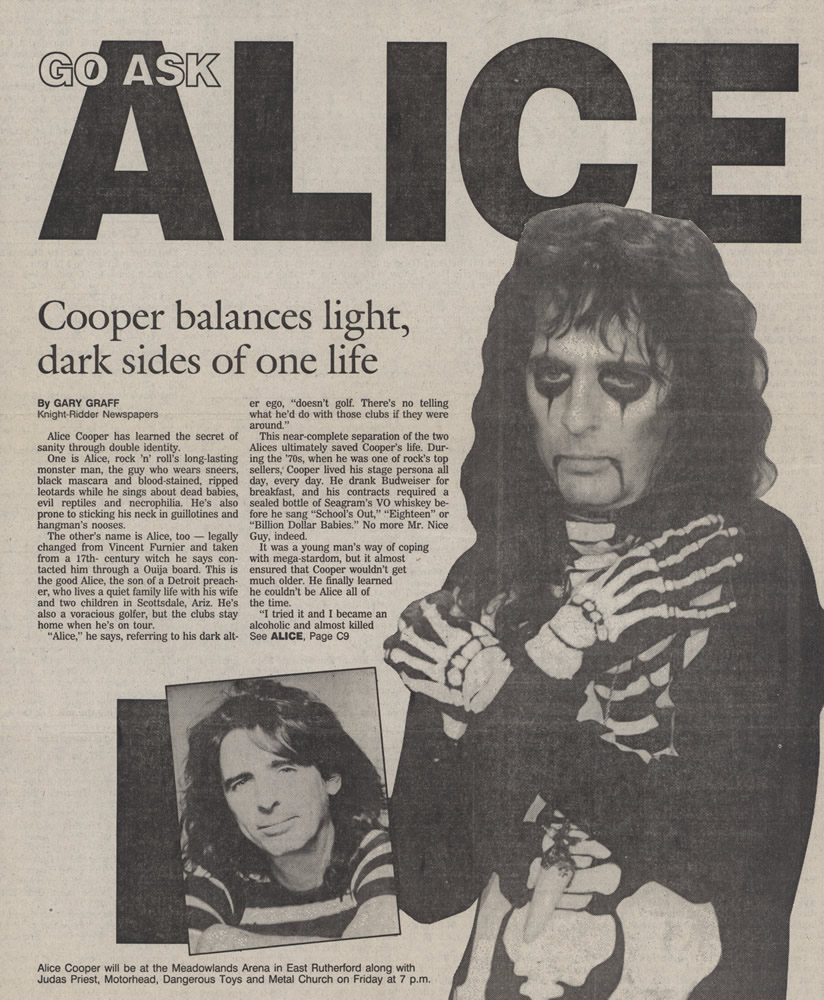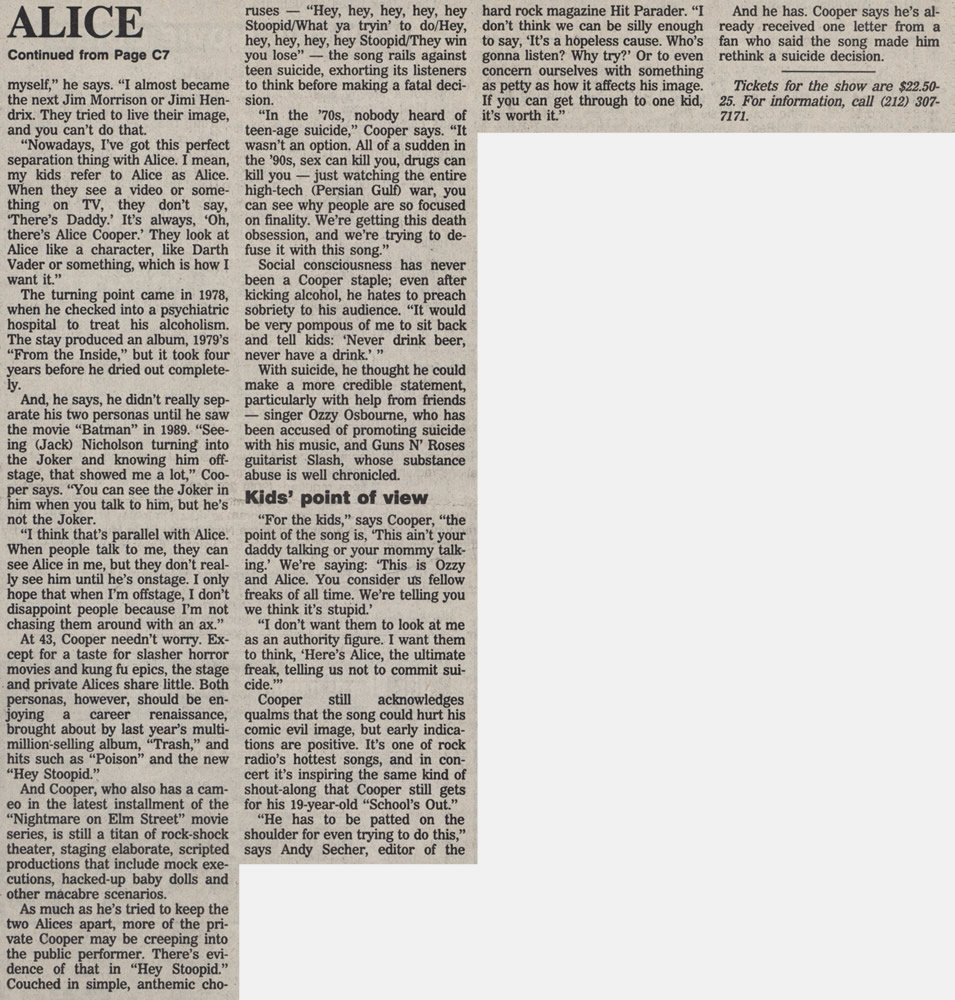Article Database

Central New Jersey Home News
August 4, 1991
Go Ask Alice
Cooper balances light, dark sides of one life
Author: Gary Graff
Alice Cooper has learned the secret of sanity through double identity.
One is Alice, rock 'n' roll's long-lasting monster man, the guy who wears sneers, black mascara and blood-stained, ripped leotards while he sings about dead babies, evil reptiles and necrophilia. He's also prone to sticking his neck in guillotines and hangman's nooses.
The other's name is Alice, too — legally changed from Vincent Furnier and taken from a 17th-century witch he says contacted him through a Ouija board. This is the good Alice, the son of a Detroit preacher, who lives a quiet family life with his wife and two children in Scottsdale, Ariz. He's also a voracious golfer, but the clubs stay home when he's on tour.
"Alice," he says, referring to his dark alter ego, "doesn't golf. There's no telling what he'd do with those clubs if they were around."
This near-complete separation of the two Alices ultimately saved Cooper's life. During the '70s, when he was one of rock's top sellers, Cooper lived his stage persona all day, every day. He drank Budweiser for breakfast, and his contracts required a sealed bottle of Seagram's VO whiskey before he sang "School's Out," "Eighteen" or "Billion Dollar Babies." No more Mr. Nice Guy, indeed.
It was a young man's way of coping with mega-stardom, but it almost ensured that Cooper wouldn't get much older. He finally learned he couldn't be Alice all of the time.
"I tried it and I became an alcoholic and almost killed myself," he says. "I almost became the next Jim Morrison or Jimi Hendrix. They tried to live their image, and you can't do that.
"Nowadays, I've got this perfect separation thing with Alice. I mean, my kids refer to Alice as Alice. When they see a video or something on TV, they don't say, 'There's Daddy.' It's always, 'Oh, there's Alice Cooper.' They look at Alice like a character, like Darth Vader or something, which is how I want it."
The turning point came in 1978, when he checked into a psychiatric hospital to treat his alcoholism. The stay produced an album, 1979's "From the Inside," but it took four years before he dried out completely.
And, he says, he didn't really separate his two personas until he saw the movie "Batman" in 1989. "Seeing (Jack) Nicholson turning into the Joker and knowing him offstage, that showed me a lot," Cooper says. "You can see the Joker in him when you talk to him, but he's not the Joker.
"I think that's parallel with Alice. When people talk to me, they can see Alice in me, but they don't really see him until he's onstage. I only hope that when I'm offstage, I don't disappoint people because I'm not chasing them around with an ax."
At 43, Cooper needn't worry. Except for a taste for slasher horror movies and kung fu epics, the stage and private Alices share little. Both personas, however, should be enjoying a career renaissance, brought about by last year's multimillion selling album, "Trash," and hits such as "Poison" and the new "Hey Stoopid."
And Cooper, who also has a cameo in the latest installment of the "Nightmare on Elm Street" movie series, is still a titan of rock-shock theater, staging elaborate, scripted productions that include mock executions, hacked-up baby dolls and other macabre scenarios.
As much as he's tried to keep the two Alices apart, more of the private Cooper may be creeping into the public performer. There's evidence of that in "Hey Stoopid." Couched in simple, anthemic choruses — "Hey, hey, hey, hey, hey Stoopid/What ya tryin' to do/Hey, hey, hey, hey, hey Stoopid/They win you lose" — the song rails against teen suicide, exhorting its listeners to think before making a fatal decision.
"In the '70s, nobody heard of teenage suicide," Cooper says. "It wasn't an option. All of a sudden in the '90s, sex can kill you, drugs can kill you — just watching the entire high-tech (Persian Gulf) war, you can see why people are so focused on finality. We're getting this death obsession, and we're trying to defuse it with this song."
Social consciousness has never been a Cooper staple; even after kicking alcohol, he hates to preach sobriety to his audience. "It would be very pompous of me to sit back and tell kids: 'Never drink beer, never have a drink.'"
With suicide, he thought he could make a more credible statement, particularly with belp from friends — singer Ozzy Osbourne, who has been accused of promoting suicide with his music, and Guns N' Roses guitarist Slash, whose substance abuse is well chronicled.
Kids' point of view
"For the kids," says Cooper, "the point of the song is, 'This ain't your daddy talking or your mommy talking.' We're saying: 'This is Ozzy and Alice. You consider us fellow freaks of all time. We're telling you we think it's stupid.'
"I don't want them to look at me as an authority figure. I want them to think, 'Here's Alice, the ultimate freak, telling us not to commit suicide."'
Cooper still acknowledges qualms that the song could hurt his comic evil image, but early indications are positive. It's one of rock radio's hottest songs, and in concert it's inspiring the same kind of shout-along that Cooper still gets for his 19-year-old "School's Out."
"He has to be patted on the shoulder for even trying to do this," says Andy Secher, editor of the hard rock magazine Hit Parader. "I don't think we can be silly enough to say, 'It's a hopeless cause. Who's gonna listen? Why try?' Or to even concern ourselves with something as petty as how it affects his image. If you can get through to one kid, it's worth it."
And he has. Cooper says be's already received one letter from a fan who said the song made him rethink a suicide decision.




